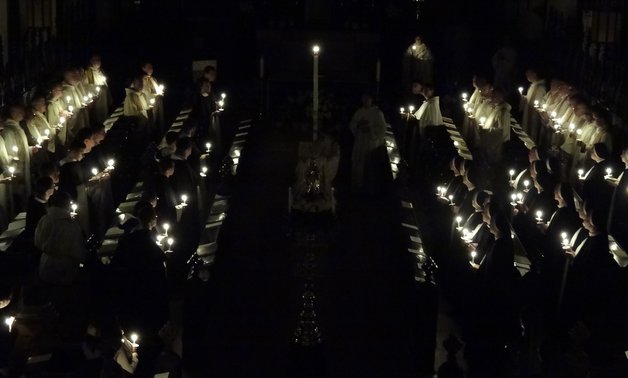The prophetic and oft-cited words of Joseph Ratzinger in 1969 predicted that the ever-increasing confidence and power of the secular culture would cause the Church to lose much of its influence and a great deal of its members, while the faithful remnant would be strengthened by the contrast. Ratzinger said, “The Church of tomorrow will emerge a Church that has lost much….In contrast to an earlier age, she will be seen much more as a voluntary society, entered only by free decision.” His prophecy was certainly correct in many respects; just glance at the headlines from the past few years to see how many Catholic colleges have been secularized or parishes closed.
However, after the nearly fifty years have passed since this prophecy, I think the original thesis can be updated. It is unquestionable that the Church has suffered some serious contractions, especially in Europe and the Americas. On the other hand, the Church in Africa and Asia has exploded, with nearly five times as many members as when Ratzinger uttered his prophecy. There the Christian and Catholic future looks brighter than most in 1969 could imagine.
But in addition to the growth of the Church in Africa and Asia, there has been growth in the Catholic Church in America that draws less attention. Many dioceses and religious congregations have seen their vocations surge to their highest levels since Vatican II. Catholic centers at many major universities are thriving, and the advent of groups like the Fellowship of Catholic University Students and Youth 2000 have breathed new life into the Church in America.
The Dominican Province of St. Joseph gets around fifteen young men each year–the highest levels since Vatican II–to consider taking vows of poverty, chastity, and obedience. The Diocese of Bismarck, North Dakota, in which I grew up among only sixty thousand Catholics, ordained six new homegrown priests in 2013 and still has over twenty seminarians. This increase wasn’t happening in either place twenty-five years ago. Many groups of women religious have seen incredible growth, like the Dominican Sisters of St. Cecilia and of Mary, Mother of the Eucharist. These groups aren’t getting people who can’t find work elsewhere, either. Among the vocations are many Ivy Leaguers, lawyers, medical doctors, and others who were esteemed in the eyes of the world.
I think the success of particular groups in the Church have a few important things in common. They’re not surprising nor are they dramatic.
Confidence in the Faith The idea that the Church must present the least controversial version of her difficult teachings ends up a diluted and tasteless drink. Since Ratzinger spoke in 1969, we have seen the issue with presenting the most benign distillation of the teachings of Christ and his Church. The Church has dwindled not because of irrelevance, but because so often those who present her teachings don’t provide an alternative to what the secular society has to offer. Through faith, we know that Jesus came to save his people, to establish the Truth in his kingdom on earth as it is in heaven. If Catholics truly believe that each person is created by God and for God, they already have the advantage over secular heresies, which, like junk foods, taste good but fail to satisfy.
Strong and honest communities “One Christian is no Christian.” The winds of the godless culture are too strong to stand alone for long. Also, from Christ himself, who gathered a community and promised to be present where two or three are gathered, Catholics know that true faith is had together. Strong families, strong communities, with strong leaders, held together by the whole body of Catholic teaching, ensure that the commitment made by the individual believer at Baptism is preserved.
Life-changing freedom Once people hear the teachings of the Church and change their lives to embrace them, they experience a newfound freedom. Modern moralities do not satisfy the inner longings of the human person, nor does a vague agnosticism answer the fundamental questions that each person asks about his or her purpose in life. Catholic moral teaching is comprehensive and practical. The strong intellectual tradition on which the moral teachings are built provide a foundation that satisfies mind and heart. The fundamental goal of the Catholic life is deep, ontological happiness, a satisfaction provided only by a relationship with the God of love.
Compassion The Catholic way of life lived fully is difficult; no one should be deceived. And because of all the pain and hurt resulting from the breakdown of the family and social structure, those to whom the Gospel is presented must be treated with compassionate respect and understanding. The beauty of Christian teaching is that Jesus Christ, the divine physician, comes to heal the brokenness in each one’s soul. His ministers in the Church must not be obstacles to that healing. The objectification of the human person in secular society meets its match in the divine dignity that Christian teaching recognizes in each person.
Jesus Christ and his Church answer the longing of the human person today no less than any other time. The Church is growing right now in the 21st century in the secular West when she is presented confidently and compassionately. If more and more Catholic parishes and organizations follow suit, the result will be a purer Church, not smaller, but larger.
✠
Image: Easter Vigil, Priory of the Immaculate Conception







